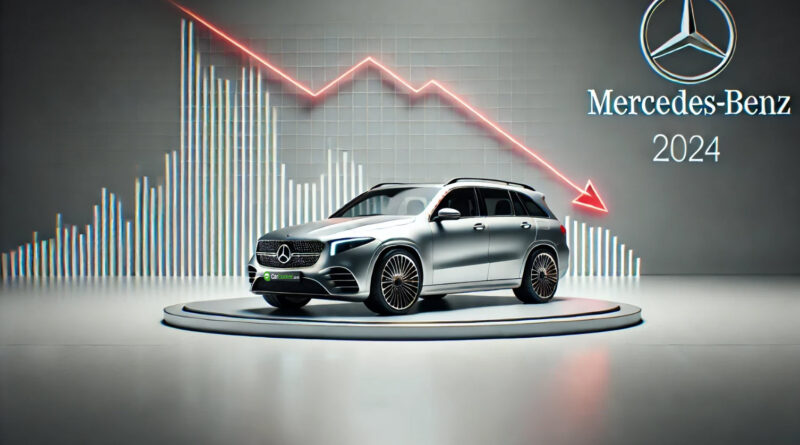Mercedes-Benz 2024 A Tough Year Sales Drop
Mercedes-Benz sales drop let’s take a closer look at what’s been happening and why this is happening. 2024 hasn’t been the smoothest ride for Mercedes-Benz. The luxury car giant reported a dip in global sales, reflecting the challenges automakers are facing worldwide. From economic pressures to supply chain hiccups, it’s been a tough year for the entire industry.
But not all the news is bad. Mercedes-Benz’s electric vehicle (EV) lineup showed impressive growth, proving that the brand’s shift toward electrification is striking a chord with customers.
How Mercedes-Benz Fared in 2024
This year, Mercedes-Benz experienced a 5% drop in global sales, with many of its key markets feeling the pinch. Economic uncertainty, rising interest rates, and supply chain issues all played a part in the slowdown.
Market Highlights
- Europe: Inflation and higher energy costs made luxury cars a tougher sell for some buyers.
- North America: Sluggish economic growth and pricier financing led to more cautious spending.
- China: While sales remained steady, the growth that once defined this market has started to slow.
What’s Behind the Sales Dip?
Several factors contributed to the decline in Mercedes-Benz’s 2024 sales, many of which reflect larger industry trends:
1. Tough Economic Conditions
Inflation and higher borrowing costs have squeezed consumers’ wallets, making luxury purchases harder to justify for some.
2. Supply Chain Woes
The industry-wide shortage of semiconductors and other critical components continued to delay production and delivery schedules.
3. Rising Competition in EVs
With more automakers launching electric models, including Tesla, BMW, and Audi, the competition in the luxury EV market has heated up significantly.
The Bright Spot: Electric Vehicle Growth
Amid the challenges, Mercedes-Benz’s EV lineup emerged as a strong performer in 2024. Models like the EQS, EQE, and EQA showed double-digit growth, proving that buyers are eager for sustainable luxury options.
What’s Driving EV Success?
- Diverse Offerings: Mercedes-Benz has expanded its EQ lineup, catering to a wide range of customers with different needs and budgets.
- Eco-Friendly Appeal: With more consumers prioritizing sustainability, Mercedes-Benz’s electric models have struck a chord.
- Performance Meets Luxury: These EVs don’t just look great—they deliver the power, comfort, and tech you’d expect from a Mercedes-Benz.
How Mercedes-Benz Is Tackling the Challenges
Mercedes-Benz isn’t sitting still. The brand has a plan to overcome the hurdles of 2024 and set the stage for a stronger future:
1. Doubling Down on EVs
With a commitment to becoming fully electric by 2030, Mercedes-Benz is developing new models and refining its existing lineup to meet growing demand.
2. Strengthening Supply Chains
To minimize disruptions, the company is investing in local production and building stronger partnerships with key suppliers.
3. Embracing Digital Sales
Mercedes-Benz is expanding its online sales platforms to reach more buyers and make the car-buying experience more seamless.
A Glimpse at the Bigger Picture
The challenges Mercedes-Benz faced this year aren’t unique—they reflect broader shifts in the automotive industry:
- Changing Buyer Preferences: People are leaning toward electric and hybrid vehicles, making traditional models less appealing.
- Economic Uncertainty: Rising costs and economic slowdowns are affecting car sales across the board, particularly in the luxury segment.
- Technology Disruption: New players and rapid advancements in EV and autonomous tech are reshaping the market.
What’s Next for Mercedes-Benz?
Despite a tough year, Mercedes-Benz is already looking ahead with optimism. Here’s what’s on the horizon:
1. Expanding the EQ Lineup
New electric models are on the way, including SUVs and more affordable EVs aimed at bringing luxury to a broader audience.
2. Advanced Features
The brand is focusing on rolling out cutting-edge tech, from improved battery ranges to next-level autonomous driving features.
3. Tapping Emerging Markets
Regions like Southeast Asia and India are becoming increasingly important as demand for luxury vehicles grows.
What Does This Mean for You?
If you’re considering a Mercedes-Benz, 2024’s challenges might actually work in your favor. Here’s why:
- More EV Options: The EQ lineup is growing, offering even more choices for those looking to go electric without compromising on luxury.
- Enhanced Tech: Mercedes-Benz continues to lead the way in in-car technology and innovation.
- Competitive Deals: The growing competition in the luxury market may translate into better offers and incentives for buyers.
Final Thoughts
Yes, 2024 was a challenging year for Mercedes-Benz sales drop, but it’s clear the brand isn’t letting it slow them down. With their strong push into electric vehicles, focus on sustainability, and commitment to innovation, Mercedes-Benz is gearing up for a bright future.
Whether you’re interested in their sleek sedans, powerful SUVs, or cutting-edge EVs, Mercedes-Benz is proving that even in tough times, luxury and innovation go hand in hand. As the automotive landscape continues to evolve, Mercedes-Benz remains a name you can count on for quality, style, and forward-thinking design.
Buying a used VW. Buying used vauxhall, BMW, Jaguar, Ford, Volvo, Range rover, Bentley, Aston Martin, Porsche, Ferrari, Lamborghini, Maserati, Hyundai, Tesla, Honda, Pagani

